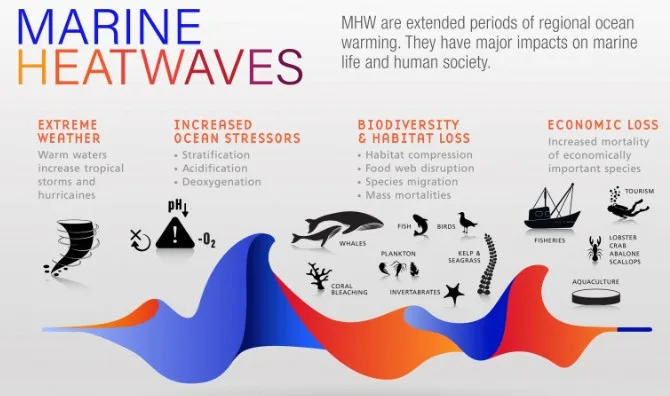Syllabus :GS3/Environment
In News
- In January 2025, marine heatwaves (MHWs) in Western Australia led to the death of over 30,000 fish.
What are Marine Heatwaves?
- They are periods of extremely high temperatures in the ocean.
- They occur when sea surface temperatures rise 3-4°C above average for at least five days.
- They can last from weeks to years.
- Climate change is the primary cause, with 90% of excess heat absorbed by oceans.
- They have become more frequent, intense, and longer-lasting in recent decades.
Global Presence
- They are observed in several oceanic regions: North Pacific, North Atlantic, Mediterranean, Caribbean Sea, and parts of the Indian Ocean.
- They can cause extreme weather events, like tropical storms and hurricanes, and disrupt the water cycle, increasing floods, droughts, and wildfires.
Recent Trends in the Indian Ocean
- MHWs, once rare in the tropical Indian Ocean, have become annual events.
- Western Indian Ocean and Bay of Bengal experienced a significant rise in MHWs, with 1.5 events per decade in the western Indian Ocean and 0.5 events per decade in the Bay of Bengal between 1982-2018.
Impacts
- Monsoons: MHWs in the western Indian Ocean and Bay of Bengal influence monsoon patterns, causing drying in central India and increased rainfall in southern India.
- These changes are linked to altered atmospheric circulation driven by the heatwaves.
- Socio-economic: MHWs negatively affect coastal communities, aquaculture, fisheries, and tourism.
- They can reduce productivity of important species like lobster, snow crab, and scallops.
- Disruption of ecosystems can harm the fishing industry and related livelihoods.

- Biodiversity and Ecosystem Destruction: MHWs can cause mass mortality of marine species, forcing them to relocate or change behavior.
- Ecosystems, such as kelp forests and coral reefs, are especially sensitive to MHWs.
- MHWs contribute to coral bleaching, reducing coral reproductive ability and making them more vulnerable to disease.
- Other threats, like ocean acidification and overfishing, compound the damage caused by MHWs.
- Ecosystems, such as kelp forests and coral reefs, are especially sensitive to MHWs.
Strategies to Combat MHWs
- Slow down ocean warming by reducing fossil fuel emissions (aligning with Paris Agreement goals).
- Invest in nature-based solutions and apply the IUCN Global Standard for Nature-based Solutions.
- Build research capacity to monitor MHWs, understand their impacts, and predict future events.
- Develop global research networks (e.g., Marine Heatwave International Group).
Way Ahead
- Governments should implement protective measures, such as marine protected areas, to safeguard vulnerable species.
- Enforce fishing regulations and catch management to limit economic losses.
- Raise awareness among stakeholders, including policymakers, researchers, and the private sector.
Source :IE
Previous article
News In Short 6-2-2025
Next article
Role of Governor Over Assenting Bills